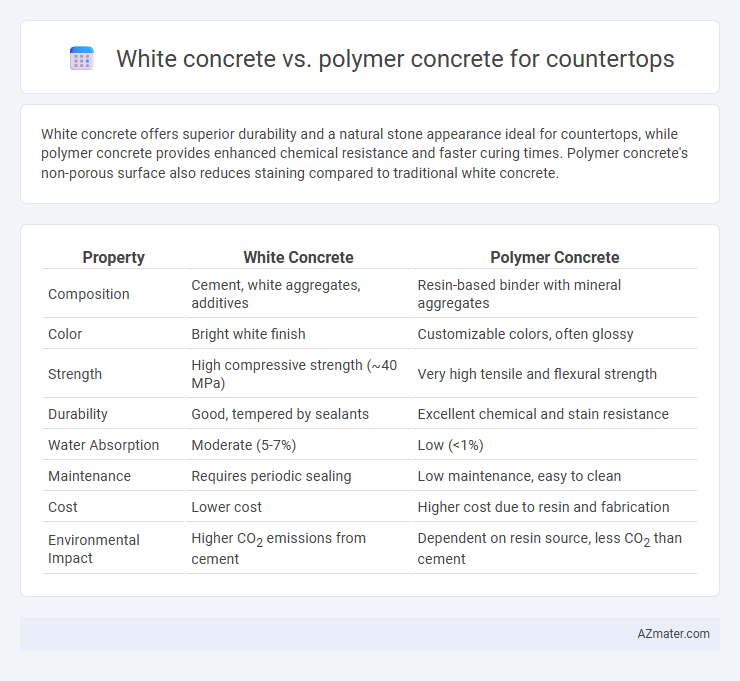White concrete offers superior durability and a natural stone appearance ideal for countertops, while polymer concrete provides enhanced chemical resistance and faster curing times. Polymer concrete's non-porous surface also reduces staining compared to traditional white concrete.
Table of Comparison
| Property | White Concrete | Polymer Concrete |
|---|---|---|
| Composition | Cement, white aggregates, additives | Resin-based binder with mineral aggregates |
| Color | Bright white finish | Customizable colors, often glossy |
| Strength | High compressive strength (~40 MPa) | Very high tensile and flexural strength |
| Durability | Good, tempered by sealants | Excellent chemical and stain resistance |
| Water Absorption | Moderate (5-7%) | Low (<1%) |
| Maintenance | Requires periodic sealing | Low maintenance, easy to clean |
| Cost | Lower cost | Higher cost due to resin and fabrication |
| Environmental Impact | Higher CO2 emissions from cement | Dependent on resin source, less CO2 than cement |
Introduction: Comparing White Concrete and Polymer Concrete Countertops
White concrete countertops offer exceptional durability and a smooth, customizable surface, making them a popular choice for modern kitchens. Polymer concrete countertops combine traditional concrete strength with enhanced resistance to chemicals and stains due to their polymer resin content. Comparing these materials involves evaluating factors such as porosity, maintenance requirements, and aesthetic versatility for countertop applications.
Material Composition: White Concrete vs Polymer Concrete
White concrete consists primarily of Portland cement, white cement, fine aggregates, and water, creating a durable and aesthetically pleasing surface with natural stone-like qualities. Polymer concrete incorporates a polymer binder, such as epoxy or polyester resin, combined with aggregates like silica sand or quartz, enhancing strength, chemical resistance, and flexibility compared to traditional cement-based mixes. The polymer matrix in polymer concrete allows for faster curing times and improved bond strength, making it an ideal choice for countertops requiring higher resistance to stains and impact.
Aesthetic Versatility and Finish Options
White concrete countertops offer a bright, neutral base that enhances modern and minimalist kitchen designs with a smooth, matte or polished finish. Polymer concrete provides greater aesthetic versatility through its ability to incorporate vibrant colors, intricate patterns, and a variety of surface textures, including high gloss and decorative aggregates. Both materials allow for customizable finishes, but polymer concrete stands out for its enhanced color retention and ability to mimic natural stone, expanding creative possibilities for unique countertop designs.
Strength and Durability Comparison
White concrete countertops offer high compressive strength typically around 8,000 to 12,000 psi, providing excellent durability for heavy use but may be prone to cracking under impact due to brittleness. Polymer concrete integrates organic polymers with aggregates, achieving tensile strengths up to 1,500 psi and superior impact resistance, resulting in enhanced durability and reduced risk of surface damage. The polymer binder also improves chemical resistance and reduces porosity, making polymer concrete more resilient against stains and environmental wear compared to traditional white concrete.
Surface Porosity and Stain Resistance
White concrete countertops exhibit higher surface porosity, which increases their susceptibility to stains and requires frequent sealing to maintain durability. Polymer concrete combines resin binders with aggregates, resulting in a dense, non-porous surface that offers superior stain resistance and minimal maintenance. The reduced porosity of polymer concrete enhances its suitability for kitchen environments by preventing liquid absorption and surface discoloration.
Installation Process and Workability
White concrete countertops offer a straightforward installation process due to their customizable mix and ease of molding, allowing for smooth finishing and polishing on-site. Polymer concrete countertops provide enhanced workability through their pre-mixed resin binder, ensuring faster curing times and high-strength bonding, which minimizes cracking during installation. While white concrete requires longer curing periods and careful moisture control, polymer concrete's lightweight nature and quick-set properties streamline the installation, making it ideal for complex shapes and rapid project timelines.
Maintenance Requirements
White concrete countertops require regular sealing to prevent staining and surface damage, as their porous nature makes them susceptible to moisture absorption and discoloration. Polymer concrete countertops offer superior resistance to stains, chemicals, and moisture due to their dense, non-porous composition, significantly lowering maintenance frequency. Routine cleaning with mild soap and water is sufficient for polymer concrete, whereas white concrete demands more frequent resealing and careful avoidance of harsh cleaners to maintain its appearance and durability.
Cost Considerations
White concrete countertops typically offer a more affordable option due to lower material costs and simpler manufacturing processes, making them popular for budget-conscious projects. Polymer concrete, while more expensive upfront, provides enhanced durability and stain resistance, potentially lowering long-term maintenance and replacement expenses. Evaluating initial costs against lifecycle value is crucial when choosing between white concrete and polymer concrete for countertops.
Environmental Impact and Sustainability
White concrete countertops demonstrate lower environmental impact due to their natural mineral composition and lower embodied energy compared to polymer concrete, which often relies on synthetic resins derived from petrochemicals. Polymer concrete, while offering superior durability and chemical resistance, typically involves non-biodegradable components that challenge sustainability efforts and increase landfill waste. Selecting white concrete supports eco-friendly construction practices by utilizing abundant raw materials with a smaller carbon footprint and enhanced recyclability.
Best Applications for Each Material
White concrete countertops excel in outdoor kitchens, modern minimalist interiors, and commercial spaces due to their high durability, UV resistance, and ability to achieve smooth, customizable finishes. Polymer concrete is ideal for indoor countertops requiring rapid curing, chemical resistance, and superior impact strength, commonly found in laboratories, medical facilities, and commercial kitchens. Both materials offer tailored performance, with white concrete suited for aesthetic, heavy-duty applications and polymer concrete favored for functional environments demanding enhanced resilience.

Infographic: White concrete vs Polymer concrete for Countertop
 azmater.com
azmater.com